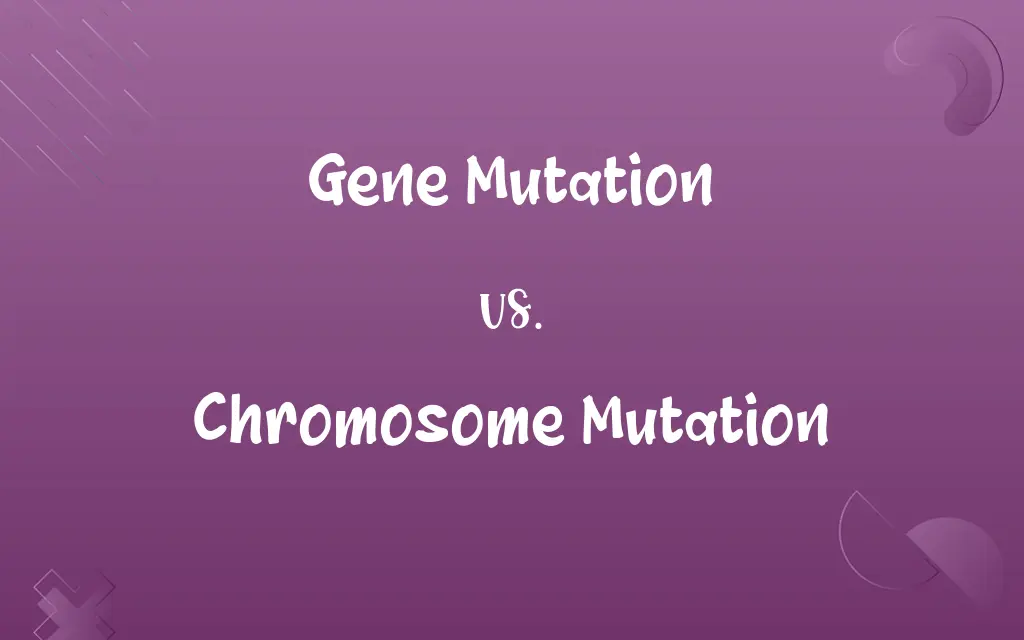Gene Mutation vs. Chromosome Mutation: Know the Difference

By Shumaila Saeed || Published on December 26, 2023
Gene mutations involve changes in the nucleotide sequence of a single gene, while chromosome mutations involve changes in the structure or number of entire chromosomes.

Key Differences
Gene mutations are alterations in the DNA sequence within a single gene, often resulting from mistakes during DNA replication or repair. Chromosome mutations, however, involve larger-scale changes that affect the structure or number of entire chromosomes, influencing many genes at once.
Shumaila Saeed
Dec 26, 2023
Gene mutations can be as small as a single base pair change (point mutation), and can lead to changes in a single protein. In contrast, chromosome mutations can result in the duplication, deletion, inversion, or translocation of large chromosome segments, affecting multiple genes and potentially leading to more significant phenotypic changes.
Shumaila Saeed
Dec 26, 2023
The impact of gene mutations is generally confined to the function of a single protein, which might result in a specific trait or disease. Chromosome mutations can have more widespread effects, potentially causing developmental disorders, as they can disrupt the balance of gene dosage and expression across many genes.
Shumaila Saeed
Dec 26, 2023
While gene mutations are common and often benign, contributing to genetic diversity, chromosome mutations are typically more severe and less frequent, often associated with significant developmental or health issues.
Shumaila Saeed
Dec 26, 2023
Gene mutations can be silent, missense, or nonsense, affecting protein structure or function to varying degrees. Chromosome mutations, such as aneuploidies (changes in chromosome number), can lead to conditions like Down syndrome, demonstrating their potential for broader biological impact.
Shumaila Saeed
Dec 26, 2023
ADVERTISEMENT
Comparison Chart
Scale of Change
Changes in a single gene
Changes in chromosome structure or number
Shumaila Saeed
Dec 26, 2023
Type of Alteration
Single base pair changes to small segment mutations
Large segment duplications, deletions, inversions, or translocations
Shumaila Saeed
Dec 26, 2023
Examples of Effects
Specific traits or diseases
Developmental disorders, broader health issues
Shumaila Saeed
Dec 26, 2023
ADVERTISEMENT
Gene Mutation and Chromosome Mutation Definitions
Gene Mutation
Contributes to genetic diversity and evolution.
Gene mutations in the DNA repair genes can increase the risk of cancer.
Shumaila Saeed
Dec 13, 2023
Chromosome Mutation
Affects multiple genes and can lead to significant phenotypic changes.
Chromosome mutations can result in developmental disorders like Turner syndrome.
Shumaila Saeed
Dec 13, 2023
Gene Mutation
Can be as small as a single nucleotide change.
A single nucleotide change can result in cystic fibrosis due to a gene mutation.
Shumaila Saeed
Dec 13, 2023
Chromosome Mutation
Less common than gene mutations and often more severe.
Klinefelter syndrome is a result of a chromosome mutation involving an extra X chromosome.
Shumaila Saeed
Dec 13, 2023
Gene Mutation
Often results in a change in a single protein.
A gene mutation can lead to a defective enzyme in phenylketonuria.
Shumaila Saeed
Dec 13, 2023
ADVERTISEMENT
Chromosome Mutation
Can involve duplications, deletions, or translocations of chromosome segments.
A translocation chromosome mutation can lead to certain types of leukemia.
Shumaila Saeed
Dec 13, 2023
Gene Mutation
A change in the DNA sequence of a single gene.
Sickle cell anemia is caused by a gene mutation in the hemoglobin gene.
Shumaila Saeed
Dec 13, 2023
Chromosome Mutation
A change in the structure or number of chromosomes.
Down syndrome is caused by a chromosome mutation involving an extra chromosome 21.
Shumaila Saeed
Dec 13, 2023
Gene Mutation
Can be silent, missense, or nonsense mutations.
A missense gene mutation can result in a single amino acid change in a protein.
Shumaila Saeed
Dec 13, 2023
Chromosome Mutation
Often associated with significant developmental or health issues.
A chromosome mutation such as aneuploidy can lead to miscarriage or birth defects.
Shumaila Saeed
Dec 13, 2023
Repeatedly Asked Queries
What is a chromosome mutation?
A change in the structure or number of chromosomes.
Shumaila Saeed
Dec 26, 2023
What is a point mutation?
A point mutation is a type of gene mutation that involves the replacement of one nucleotide with another in the DNA sequence.
Shumaila Saeed
Dec 26, 2023
Can gene mutations be inherited?
Yes, gene mutations can be inherited from one generation to the next if they occur in germ cells (sperm or egg cells).
Shumaila Saeed
Dec 26, 2023
Are all gene mutations visible in an individual's physical traits?
No, many gene mutations are not visibly apparent and may only affect the individual at a molecular or cellular level.
Shumaila Saeed
Dec 26, 2023
Are gene mutations always harmful?
Not always; some are benign or even beneficial.
Shumaila Saeed
Dec 26, 2023
What are the types of gene mutations?
Gene mutations can be classified into several types, including point mutations, insertions, deletions, and frameshift mutations.
Shumaila Saeed
Dec 26, 2023
Can gene mutations occur spontaneously?
Yes, gene mutations can occur spontaneously during DNA replication or due to environmental factors.
Shumaila Saeed
Dec 26, 2023
How do chromosome mutations occur?
From errors during cell division or exposure to certain chemicals or radiation.
Shumaila Saeed
Dec 26, 2023
What is a frameshift mutation?
A frameshift mutation is a type of gene mutation that results from the insertion or deletion of one or more nucleotides, causing a shift in the reading frame of the gene.
Shumaila Saeed
Dec 26, 2023
What is a translocation in chromosome mutations?
A translocation is a type of chromosome mutation where a segment of one chromosome breaks off and attaches to another chromosome.
Shumaila Saeed
Dec 26, 2023
Can chromosome mutations be inherited?
Yes, some chromosome mutations can be inherited if they occur in germ cells.
Shumaila Saeed
Dec 26, 2023
Are chromosome mutations always severe?
They tend to be more severe, but effects vary.
Shumaila Saeed
Dec 26, 2023
What is a duplication in chromosome mutations?
A duplication is a type of chromosome mutation in which a segment of a chromosome is duplicated or repeated.
Shumaila Saeed
Dec 26, 2023
Can chromosome mutations be diagnosed prenatally?
Yes, chromosome mutations can be detected through prenatal genetic testing such as amniocentesis or chorionic villus sampling (CVS).
Shumaila Saeed
Dec 26, 2023
How do gene mutations contribute to genetic disorders?
Gene mutations can disrupt normal gene function, leading to the development of genetic disorders if critical genes are affected.
Shumaila Saeed
Dec 26, 2023
What is a deletion in chromosome mutations?
A deletion is a type of chromosome mutation in which a portion of a chromosome is lost or deleted.
Shumaila Saeed
Dec 26, 2023
Share this page
Link for your blog / website
HTML
Link to share via messenger
About Author
Written by
Shumaila SaeedShumaila Saeed, an expert content creator with 6 years of experience, specializes in distilling complex topics into easily digestible comparisons, shining a light on the nuances that both inform and educate readers with clarity and accuracy.









































































